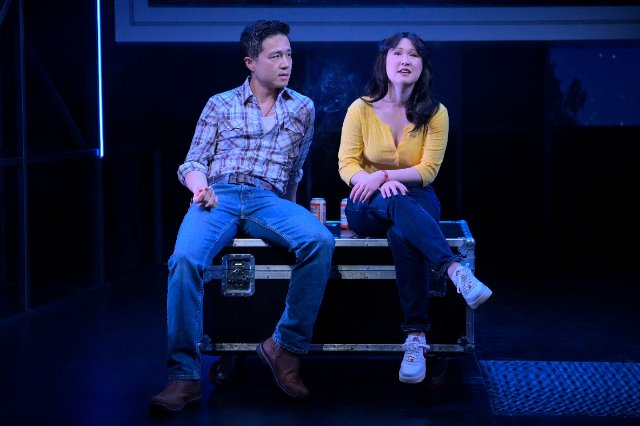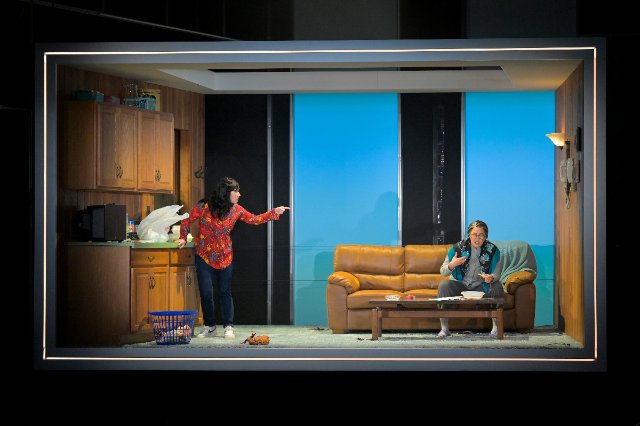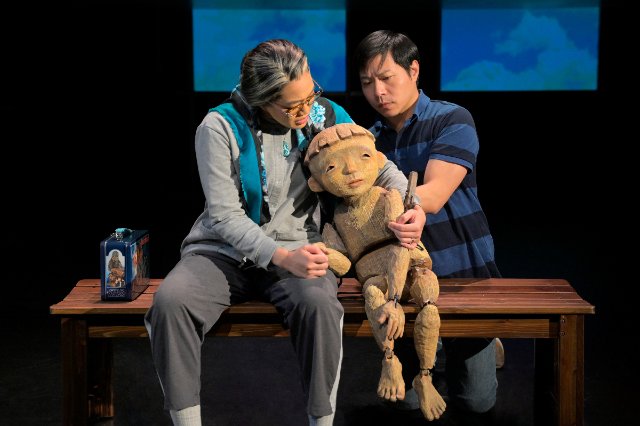Poor Yella Rednecks - Vietgone 2
A Vietnamese Family in Arkansas - Strangers in a Strange Land
By: Victor Cordell - Apr 15, 2023
With his highly successful “Vietgone,” playwright Qui Nguyen, told the beginning of his family’s immigrant story, following the fall of Saigon in the Vietnam War. His equally thoughtful and humorous sequel, “Poor Yella Rednecks,” continues the family’s saga. Amusingly, he writes himself in as a character in the play and facetiously disavows to the audience that its characters are real.
The overall narrative of “Poor Yella Rednecks” appeals, and the situations seem genuine. Although the members of the family reveal considerable flaws, they elicit empathy, and are portrayed by a crack ensemble. The playwright has become expert at using actors in multiple roles, and this highly talented cast rises to the occasion, showing their versatility.
Like many immigrants, Quang finds that American streets are not paved with gold and that foreign training and experience often don’t translate. A helicopter pilot in the South Vietnam Air Force, he now works menial jobs in the redneck town of El Dorado, Arkansas. His wife, Tong, is attractive, but lacks education and English language competence. Each has trigger traits that will cause division in their future. Quang suffers vulnerability to a sin of the flesh. Tong’s tripwire results from her own integrity and assertiveness. She finds it hard to hold a job for long, as she tends to slap customers and bosses when they take uninvited liberties with her.
Quang and Tong face normal immigrant challenges caused by loss of prestige and inability to speak with confidence in the new language. But we witness not only the effects of how the “natives” feel about the newcomers, often with different religion, food, race, and more, but there is also a bite back. The Vietnamese family complains about the local yokels’ bad manners, bad food, racism, and ignorance.
Because their refugee camp was in Arkansas, the couple have settled nearby, but a former military subordinate of Quang’s, Nhan, moved onto Houston, with a large Vietnamese population, and thus many of the amenities of their homeland. Quang is tempted to make the move and even makes a visit, but Tong demurs, saying that it would only offer more reminders that they are no longer in Vietnam, the country that they love. It is similar to the decisions that minority immigrants have faced for generations, for instance, whether to live in the social comfort of Little Italy or move to a white bread suburb.
Cultural isolation has its price, and one is that Tong’s mother, Huong, who speaks no English, is virtually limited to their home, other than for grocery shopping. She’s feisty and raucous, and acts as built-in day-care and baby sitter for her six-year-old grandson, who also speaks no English. That grandson is called Little Man and is none other than Qui Nguyen (unless you accept his denial that the play is not autobiographical). The family faces the dual traumas of the boy being bullied at school and the threat of his being forced to repeat first grade because of learning deficiencies caused by lacking language. Then Quang and Tong’s relationship is disrupted by unexpected news and events.
A splendid device used in the play is that rather than using a child to play the part of Little Man, a wood-colored, segmented, life-size puppet is operated and spoken by an actor. The effect charms. Although the puppet’s face lacks moving parts, its subtle tilts and movements effectively depict emotions. And the slow movement of the puppet’s hand toward another character’s arm perhaps draws more attention and conveys more meaning than if Little Man were a real child. The puppet even gets into a fight, and the audience cheers him on as if it were a sentient being.
Director Jaime Castañeda ensures that production values meet the highest professional standards. Tanya Orellana’s tiered stage is at once appealingly austere, yet changeable and suggestive enough to let the imagination fill in the blanks. Ambient lighting as well as generous use of various types of lights embedded in the set, designed by Yi Zhao, provide another visual layer, while Jake Rodriquez’s in-depth soundtrack adds to the overall effect.
“Poor Yella Rednecks” was a hit with the audience at its San Francisco debut, though the impact of friends and family can be distorting. Two aspects of the script may reduce the pleasure of this otherwise excellent production for some of the audience. First is the considerable use of rap/hip-hop, sometimes organically, other times just plopped into the dialogue. Although the origins of these talk/sing forms predate the period of the play, their popularity didn’t really emerge until significantly later, so their use feels anachronistic. And to some listeners, the vocal stylings are simply harsh and unappealing.
I’m no prude, but the other detraction is the gratuitous and puerile overuse of vulgarity, which doesn’t fit to the situations depicted and is aesthetically unpleasing to some. Is the playwright making a freedom-of-speech statement or what? In one rap, Tong uses the “f” word every few seconds, and in another, she repeats the phrase “I don’t give a s**t” what must have been 20 times. The excesses parallel the political strategy of appealing to the base, but with the risk of losing usual supporters who reject the resulting extremism.
“Poor Yella Rednecks – Vietgone 2,”is written by Qui Nguyen, produced by American Conservatory Theater, and plays at Strand Theater, 1127 Market Street, San Francisco, CA through May 7, 2023.






